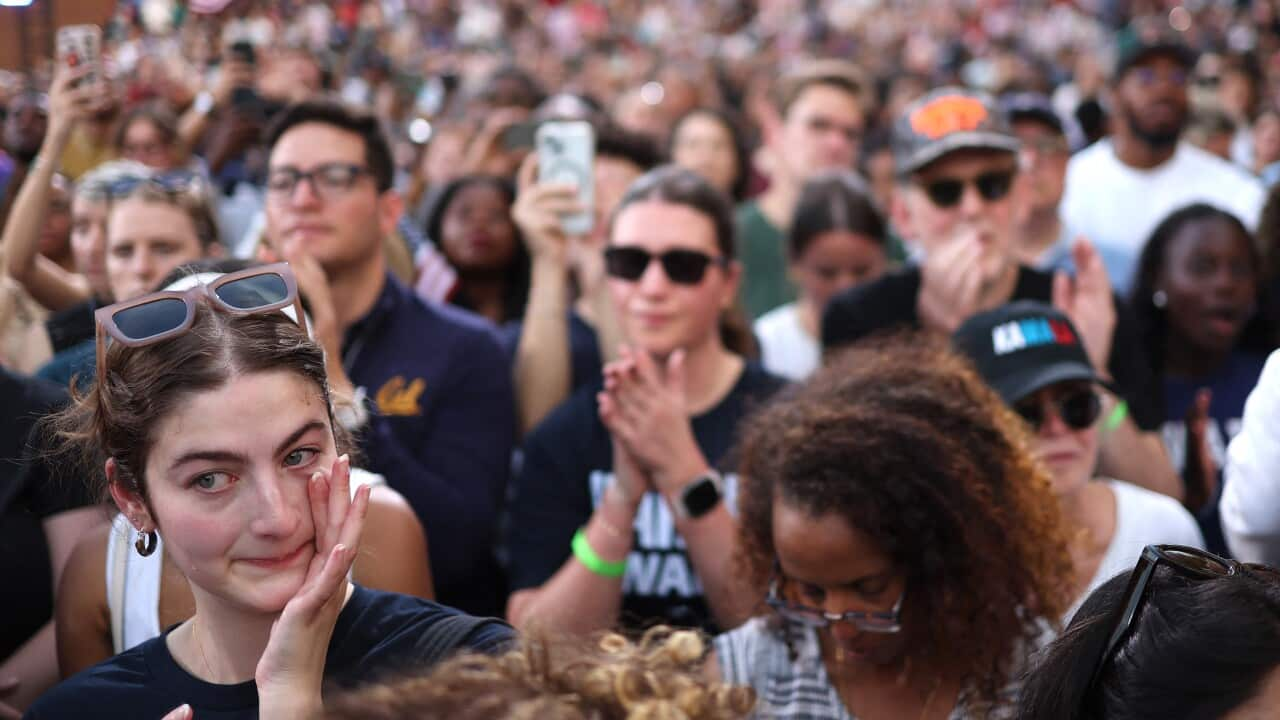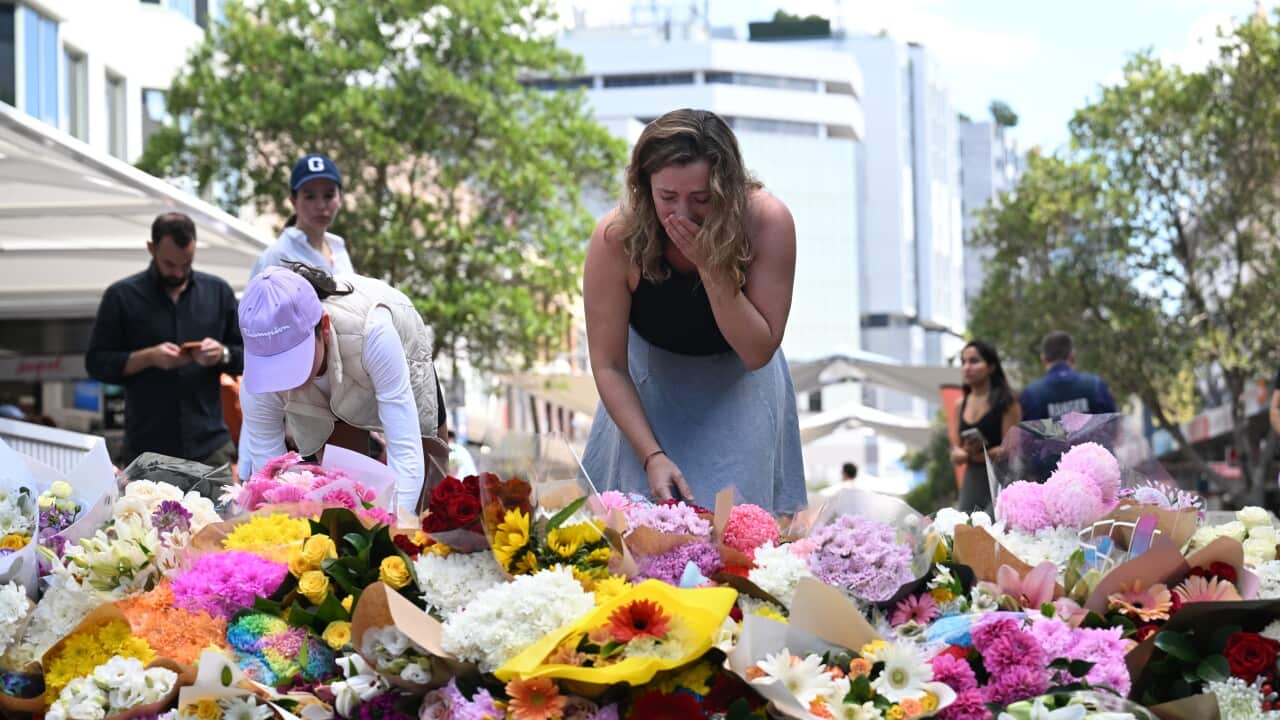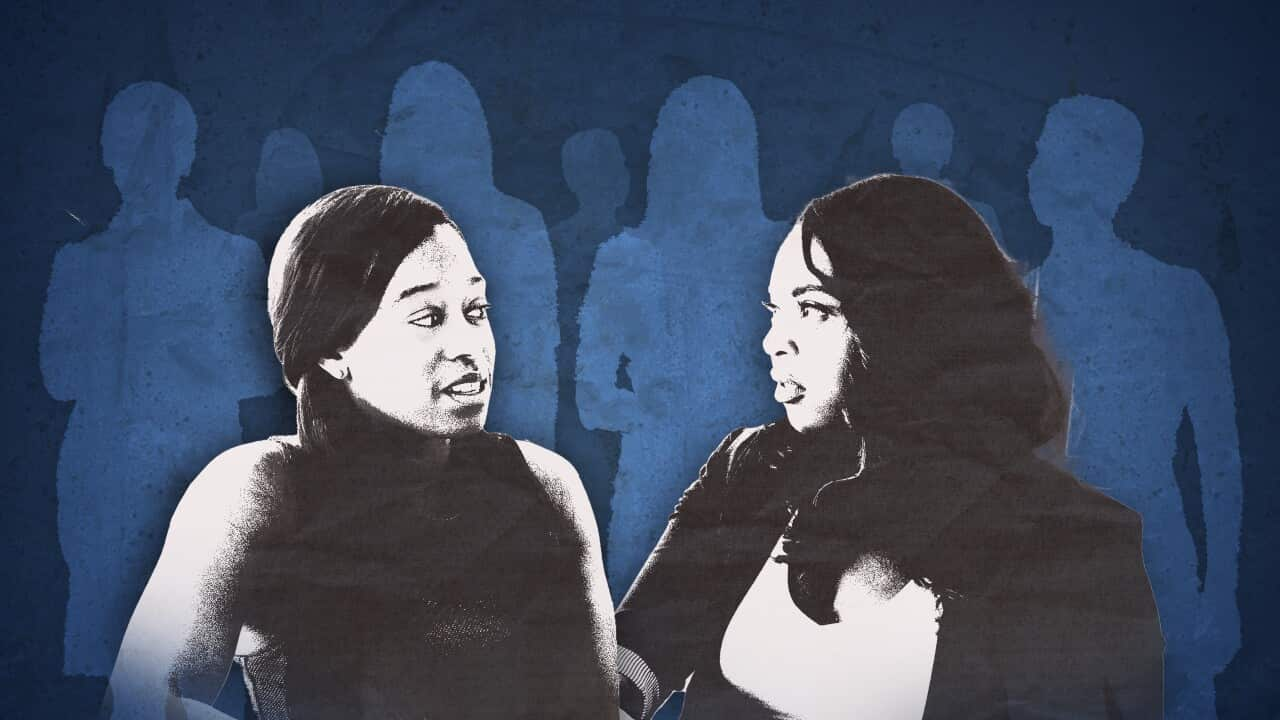Content warning: Distressing content
As the news came through that Donald Trump would be the 47th president of the United States, search traffic for the '4B movement' surged in the country.
The term also appeared in the comments sections of videos lamenting that had been returned to power.
"4B MOVEMENT NOW," one person wrote. "4B movement is coming," said another.
What is the 4B movement?
The '4B' feminist movement encourages women to live separate lives from men — meaning no sex, childbirth, dating or marriage with men.
Earlier this year, the movement was already mobilising in the US and a group of 4B members agreed to chat with SBS The Feed.
On the video call, the women were swapping tips on how to live out the 4B life. They connect online most weeks to discuss the movement.

Women are encouraging others to join the 4B movement after Trump's win.
"If you have to walk down the aisle at the grocery store, use the opposite way," Vanessa added, saying it helps minimise her interactions with men. The comments were well-received by the group.
One American, Mackenzie (not her real name), shared her blanket distrust.
"To me, it's a man, and I know that I need to stay away," she said.
In this group, some cast blame on women for continuing to associate with men and encouraged others to denounce religion.

Many women have found the movement online and later joined. On TikTok, discussions about the movement have attracted millions of views.
The movement emerged in South Korea in the mid-2010s. But a sister group, created last year, has slowly been gaining attention in Western countries, including Australia.
To me, it's a man, and I know that I need to stay awayMackenzie
What do 4B followers believe in?
The core beliefs of the women can be whittled down to four "no" rules: no sex, no childbirth, no dating and no marriage with men. In Korean, the four words begin with 'bi': bihon, bichulsan, biyeonae and bisekseu.
In the eyes of 4B followers, boycotting men gives women a chance to live out their full potential, protect themselves and punish men. Many condemn all men and say the days of "fighting the patriarchy" or justifying why women deserve to live are behind them.
Last year, a US woman — who uses the pseudonym Supreme — created a '4B' group for women in Western nations inspired by the women in South Korea.
"Moving away or separating from men is the only answer," Supreme told The Feed.
"When men are not getting dates, and they're not having sex, and they're not having babies, and they're not getting married — this shakes the structure."
Maybe then, Supreme said, will they listen.
The idea is to agitate, but for many, it's also a way to live a safer life.
A majority of members were from the US, but others were from the UK, Uganda, Korea and elsewhere. At least one member was from Australia.
Supreme has attracted about 100 members to her group. More online say they live by '4Bs' but aren't affiliated with the group.
Where did the 4B movement come from?
The movement initially started in South Korea to protest against a cultural expectation to marry and pushed a "no marriage" lifestyle.
The movement strengthened in 2018 after a rise in "spycam videos" — where women were secretly filmed in bathrooms or during sex — mostly by men. Thousands of people went to Seoul to protest the crime.

Female protesters shout against 'spy-cam porn' in the South Korean capital Seoul in August 2018. Spycam videos made headlines daily and largely involved men secretly filming women in schools, offices, trains, toilets and changing rooms. Source: AFP, Getty / Ed Jones
Mirya has been living by the 4Bs for years
For Mirya, every stage of her life is bookmarked by violence at the hands of men. Talking to the group, she shared that she is a trafficking and sexual assault survivor.
She said both her mother and her grandmother are victims of violence, and for the past seven-and-a-half years, she's chosen to be abstinent. When she found the group, she said she was relieved to find others like her.
"I have absolutely zero interest in complicating or messing my life with all of the drama and the crap that gets brought from men," Mirya said.
"We have no autonomy whatsoever with our bodies now, and we want those things back. It's now too dangerous for us to even be in relationships with men."

'Ocean' and Mirya are both living by the 4Bs after a series of violence plagued their lives. Source: Supplied
In the group, the 4B rules are strict, no buts. The women say it's not for everyone. Some blame women for being part of the problem by continuing to associate with men.
"If we continue to have babies, then we can't keep crying tomorrow," Supreme said.
Women in the movement who have children vow not to have any more. Mothers of sons vow to teach them to "do better" — and there are online seminars to spread these messages.
Supreme also rejects all religions and tells new members to do the same as the encouragement to have children in certain religions conflicts with their teachings.
In the video call, members explained the reasons that led them to this point.
They addressed the widespread incidences of violence and sexual violence against women and acknowledged that women of colour are overrepresented as victim-survivors. They referenced the 19-year-old American woman believed to have been killed and dismembered on a first date just a few weeks ago.
They mentioned the five women killed in the Bondi Junction stabbing earlier this year.
They noted that women do more unpaid work, , the chorus of women online who say they would rather be in a forest with a bear over a man because — "the worst a bear could do is kill me" — the fact that child marriage is still legal in the US. And to all that, they say, 'we're done'.

There have been nationwide rallies this weekend calling for action to end violence against women. Credit: SBS News
One group member, 'Happy', said if "men are women and children's number one predator", she doesn't think it's radical at all.
In her eyes, "There's no such thing as rehabilitating. And so this whole, 'it's not all men thing', the system that we live in is not working for women. So this is an appropriate measure."
Supreme, who has attracted women mostly through social media live streams, said some men in the audience don't understand why the women have chosen to live separately. Instead, some have responded with threats of sexual violence, she said.
Many in the group stay anonymous to give themselves peace of mind and minimise the potential for doxing, the intentional exposure of an individual's identity through private online without their consent. Supreme has been doxed in the past.
Could the 4B movement ever take off in Australia?
In the seventies, some "radical feminists" in Melbourne had a similar approach and separated from men, forming relationships with one another not because it was their sexual orientation but to send a message, said Professor Catharine Lumby, a gender expert at the University of Sydney.
She said the movement was hard to measure in numbers — but it was significant at the time.
"It was literally done by setting up a commune or shared house where no men are allowed in," Lumby said.
For some women who subscribe to radical feminism, she said: "In some individual cases, it might be as a result of serious trauma. In other cases, it's really a political ideology."
You have to be an optimist to be a feministProfessor Catharine Lumby
"I also understand why we're talking about the 4B movement; I can understand the anger a lot of women have."
So, could it happen again in the form of '4B'? Probably not, Lumby said.
While it's popular online and has invigorated conversation in other countries, she couldn't imagine it having broad appeal in Australia — mostly because the general expectation to marry and have kids is not as widespread as it used to be.

Almost 90 per cent of Australian victims of intimate partner homicides are women. Source: AAP / Lukas Coch
"This may be the moment of reckoning. I am very hopeful that it is," Lumby told The Feed in May. But she added: "We get nowhere on this issue unless men make it their problem."
"I believe in dialogue with men, not shutting them down or shutting them out ... You have to be an optimist to be a feminist."
So, did it make a difference in South Korea?
Some people have said that the movement and its impact in South Korea have been inflated online.
But PhD researcher Yun-Hee Cho from South Korea's Yonsei University said while the movement's popularity has dimmed since its initial emergence, she rejects the idea that it didn't impact cultural expectations in South Korea.
"It really helped [with] empowering women to know they can have other lives, their own life, other than just being married to men or just being a wife or mother."
But she said a movement like this one risks vilifying certain women, including married women.
"Feminism must be for all women," she said.
Feminism must be for all womenPhD researcher Yun-Hee Cho
Ocean, who has been voluntarily celibate for seven years, hopes others will follow her path.
"I hope it grows like wildfire. I hope we get loud, and I hope that the world has no choice but to hear what we have to say and reflect on what the hell led us to here," she said.
"What I have recognised with men is that they are not capable of loving women .... our life is drained from us in the most cruel of ways by men and I'm so done with it."
If this story has raised any issues for you, help is available at Lifeline on 13 11 14.
If you or someone you know wants to talk about sexual assault or harassment, family or domestic violence, call 1800RESPECT on 1800 737 732 or visit www.1800RESPECT.org.au In an emergency, call 000.













